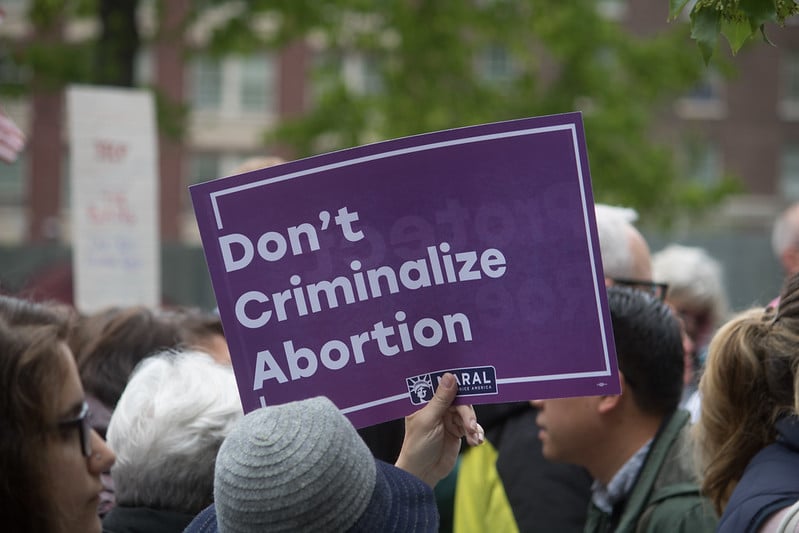The year is 2022. The Supreme Court just issued its ruling in Dobbs v. Jackson Women’s Health Organization, a majority holding that some pre-viability prohibitions on abortions are legally permissible. Roe v. Wade is effectively no more.
That is a likely near future, according to legal experts.
Reproductive rights advocates have vowed to continue the fight for abortion rights in statehouses and lower courts if this comes to pass.
Meanwhile, former President Donald Trump, whose Supreme Court nominations got us here, said that people who don’t want to continue a pregnancy may have to “go to another state” to obtain abortions. The anticipated Supreme Court decision would create no federal criminal law against abortion, but would enable states to criminalize it—and there are clearly some that would, and others that would not.
But what about the possibility of going to another county?
The incredibly broad discretionary authority of local prosecutors means that in anti-abortion states, individual district attorneys could decline to enforce post-Roe abortion bans by not charging cases in their county.
Conservatives angry about progressive prosecutors not enforcing oppressive criminal laws only have a few sturdy legal options for crackdowns.
But red-state DAs who count themselves part of the so-called progressive prosecutor movement might need to be publicly circumspect about their intentions. Some of their peers have drawn a heavy backlash by issuing broad reformist proclamations.
Recent history shows that conservatives angry about progressive prosecutors not enforcing oppressive criminal laws only have a few sturdy legal options for crackdowns.
They can pass a law or state constitutional amendment giving governors broad, unqualified power to force locally elected prosecutors to bend to their will or get out of office. New York has this, but it is virtually never used in practice, likely due to the political firestorm it would create.
They can also go the state attorney general route, giving simultaneous jurisdiction to that official when a local prosecutor refuses to prosecute. That’s a path that Attorney General-elect Jason Miyares of Virginia, for example, is currently pushing. But like the first option, such laws would provoke significant resistance.
Prosecutors’ associations, which heavily lobby many state legislatures, tend to fight tooth-and-nail against any new limits on their discretion. Despite being staunchly prohibitionist, the Indiana Prosecuting Attorneys Association, for example, went to bat for Indianapolis prosecutor Ryan Meares when the legislature wanted to give the state AG the ability to prosecute the marijuana possession cases he declined.
Based on recent court decisions, the strongest tool conservatives have is to allow governors to transfer cases to different prosecutors based on “good and sufficient reason.” That is how then-Florida Governor Rick Scott was able to rip away former Orlando State Attorney Aramis Ayala’s capital murder cases, after she declared she would never seek the death penalty.
But even that can be worked around, depending on how politically savvy the prosecutor is.
In 2017, when the Florida Supreme Court ruled on the dispute between Scott and Ayala, it noted that the courts can review governor’s actions under this statute for arbitrariness. In siding with Scott in the dispute, the majority opined that barring the death penalty, rather than “making case-specific determinations as to whether the facts of each death-penalty eligible case justify seeking the death penalty,” is equivalent to exercising “no discretion at all.”
However, there is no qualification of how detailed these “case-specific determinations” have to be, and no real way to evaluate a prosecutor’s good faith besides their own public statements.
It could be the quietly progressive prosecutor’s time to shine.
In the abortion context, a post-Roe prosecutor could say they are open to prosecuting abortion cases, but that they have not come across a case that warrants prosecution under the law—in practice declining all such prosecutions on a “case-specific” basis.
In support of this idea, despite the decision in Ayala v. Scott, many elected prosecutors, including in Florida, seldom or never seek the death penalty. Palm Beach County State Attorney Dave Aronberg had two terms of office under his belt before he finally obtained a single death sentence at the end of 2020. But Palm Beach County has seen close to a hundred homicides each year for the past decade, and Florida law makes death penalty eligibility for murder extremely broad.
Yet no governor retaliated against Aronberg. It is even questionable whether such action would have been legal, so long as the prosecutor had not made a statement contradicting claims of individualized determinations based on the facts.
Of course, relying on county prosecutors to take this path can only be seen in terms of mitigating a disaster. Followed strategically, this plan could nonetheless impact many thousands of lives.
Prosecutors with a conscience will need to operate smartly if they’re to reduce the many harms of the likely end of Roe—in many cases probably eschewing grand announcements and media attention in order to achieve more. It could be the quietly progressive prosecutor’s time to shine.
Photograph via Flickr/Creative Commons 2.0





Show Comments